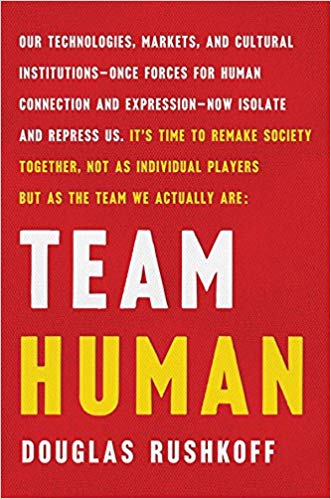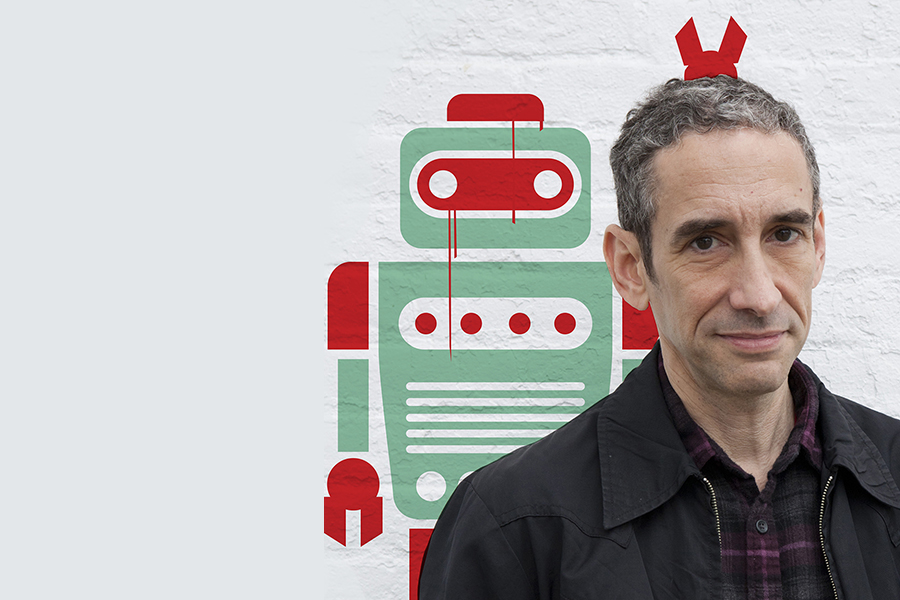Our technologies, markets, and cultural institutions — once forces for human connection and expression — now isolate and repress us. It’s time to remake society together, not as individual players but as the team we actually are: Team Human.
Autonomous technologies, runaway markets, and weaponized media have overturned civil society, paralyzing our ability to connect meaningfully or act purposefully. Everyone is asking how we got here, as if this were a random slide toward collective incoherence and disempowerment. It is not.

There’s a reason for our current predicament: an anti-human agenda embedded in our technology, our markets, and our major cultural institutions from education and religion to civics and media. It has turned them from forces for human connection and expression, into ones of isolation and repression. It doesn’t have to be this way.
Douglas Rushkoff argues that we are capable of not only transcending the paralyzing effects of these institutions, but reconnecting with one another and remaking society toward human ends rather than the end of humans. A sweeping treatise, Team Human is comprised of one hundred digestible passages detailing the history of our relationships with language, media, money, religion, politics, and technology, lucidly rendering our tenuous union with each today.
Rushkoff recasts evolution from the myth of “survival of the fittest” to the reality of collaboration. “If humans are the most advanced species,” Rushkoff writes, “it is because we have developed the most advanced ways of working together.” Yet, the very mechanisms we developed to enhance our connectivity — from language to computers — have left humans’ social nature behind.
The internet is just the latest of these advances, an unprecedented opportunity for human connection that has been developed instead into an environment biased toward extraction and distrust. Humans have gone from being the conscious users of technology to the passive objects. “On the Internet of Things,” Rushkoff explains, “we humans are the things.” He exposes the roots of the anti-human philosophy informing both Wall Street and Silicon Valley alike: treating people as the problem and technology as the solution. “Instead of unleashing the wild possibilities of the human imagination, we end up using technology to make people behave more consistently with their algorithmically derived consumer profiles.”
As a result, people accept technology’s priorities as our own. We measure human beings in terms of utility value — speed and efficiency — over the creativity, novelty, and rapport that make us truly human. Relying on data and analytics, we treat the future as inevitable rather than something we create together, in the present. We see people with contrary opinions as adversaries to conquer rather than humans with whom to engage. Incapable of establishing genuine rapport with others online, we blame one another rather than our machines.
Team Human seeks to liberate us from this conundrum by celebrating our humanity and redefining being human as a team sport. Instead of rejecting technology, Rushkoff asks that we embed human values into our digital future. He shows how the blockchain will never substitute for human trust, and Artificial Intelligence can never supplant human consciousness. Instead, we must restore the primacy of real-world, face-to-face, eye-to-eye contact in everything from education and business to romance and diplomacy.
Rushkoff also shares practical solutions for building solidarity into digital platforms, cooperative ownership into business plans, and compassion into policy debates. We must learn to “find the others” — not just those with whom we agree, but those who we believe are on the “other side.” It’s time for human beings to intervene on our own behalf. We are not the competing individuals we have come to believe we are.
Named one of the world’s 10 most influential intellectuals by MIT, Douglas Rushkoff is an award-winning author, broadcaster, and documentarian who studies human autonomy in the digital age. The host of Team Human podcast, Rushkoff has written 20 books, including the bestsellers Present Shock and Program or Be Programmed; written regular columns for Medium, CNN, Daily Beast, and the Guardian; and made the PBS Frontline documentaries “Generation Like” and “Merchants of Cool.”




































